|
WHO: |
Cool Trash; Emma Crutcher |
||
| WHAT: | Artist and educator giving single-use plastics a second life | ||
|
SIGNATURE PRODUCTS: |
Buttons, earrings, hair clips, pouches, keychains |
||
|
IN-PERSON: WEBSITE: |
South Minneapolis, frequently teaches classes for the community |
By Michelle M. Sharp, Founder and Content Creator of Meet the Minnesota Makers
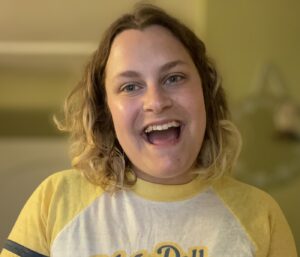 Have you ever met someone who is really excited about the stuff that other people throw away?
Have you ever met someone who is really excited about the stuff that other people throw away? 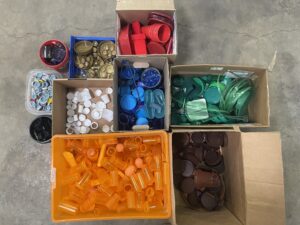
So much so that they started using the hashtag of “cooltrash” when they were a teenager?
For Emma Crutcher of Cool Trash in South Minneapolis other people’s trash is literally her treasure.
Her workshop’s raw materials are an amazing opportunity because single use plastics never go away.
What Makes Plastics Precious?
Very little of it is truly recycled due to technological limitations, lack of economic incentives, and sometimes plastic products are simply put into curbside recycling without being clean and dry.
clean and dry.
Reusable bags, buying in bulk, and bag taxes are all steps to reduce our dependence on plastic.
However….
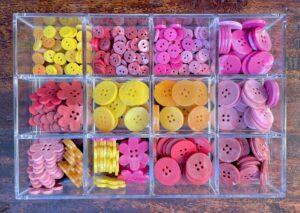 What if, instead of looking at plastics as a problem, we viewed it as an opportunity?
What if, instead of looking at plastics as a problem, we viewed it as an opportunity?
Emma collects plastic waste from local businesses Marigold, Indeed Brewing Co., Blackstack Brewing, Milkweed Coffee, and more – the list is only growing – to make something new.
A self-described designer, inventor, and builder as a child growing up in the Ozarks, Emma moved to the Twin Cities to study at the University of Minnesota. She graduated with a double major in art and urban studies with a minor in sustainability. “My studies helped me to understand how urban communities depend on broader systems. I was able to get a better sense of how those systems work and the challenges where they fall short. When large-scale systems lack efficiency and functionality, many communities figure out how to fulfill needs for each other through forms of mutual aid,”
Precious Plastic is a perfect example of this – it recognizes the inefficiency of municipal recycling systems and challenges communities to take recycling into their own

Photo credit: Lindsey Flicker
hands. Not only is the waste material diverted from landfills and waterways, functional, beautiful products and ultimately entire new economies rise from the use of this framework.
Emma discovered the Precious Plastic project, which was founded in 2013. This project hosts a suite of open source plans to build machines to recycle plastic on a small scale. “This movement challenges us to think about plastic as a valuable resource for building and creating,” explains Emma. “It’s durable, it’s everywhere, and it’s often free. I work within my community to turn this unwanted surplus into a desired end product.”
Building A Circular Economy
 In short, the Precious Plastic project makes a circular economy possible by taking a waste product and turning it into a resource. While open-source plans for plastic recycling machines are available and fully built machines are sold on the Precious Plastic Bazar, most people start on a DIY level with easily sourced second hand home appliances like a paper shredder, toaster oven, or panini press. The products made with these basic or bespoke recycling machines, along with the network of people working with recycled plastic, makes up a new economy out of trash.
In short, the Precious Plastic project makes a circular economy possible by taking a waste product and turning it into a resource. While open-source plans for plastic recycling machines are available and fully built machines are sold on the Precious Plastic Bazar, most people start on a DIY level with easily sourced second hand home appliances like a paper shredder, toaster oven, or panini press. The products made with these basic or bespoke recycling machines, along with the network of people working with recycled plastic, makes up a new economy out of trash.
A former special education assistant for the Minneapolis Public Schools, Emma jumped into the Precious Plastic Project full time after COVID. “I had been interested for a long time. I didn’t know if I’d ever have the time to really get involved. After COVID, so many of us had different perspectives on the value of “work” and our jobs, it really felt like the right time to take the risk and try this thing out full-time.” shares Emma. “It has been a wild ride.”
Making Treasure from Trash
With her sheet press in action, Emma’s workshop is a veritable wonderland of colorful plastics awaiting their new purpose. PP and HDPE 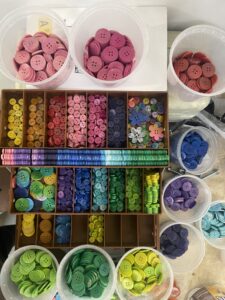 plastics work the best for Cool Trash’s repurposing projects. A fundamental rule is that one should never mix plastic types when creating something new. The item can no longer be recycled at the end of its life if it is comprised of different plastic types. Emma tests all the plastic she collects to sort out PET (#1) and PVC (#3) which are unsafe to work with on a DIY scale.
plastics work the best for Cool Trash’s repurposing projects. A fundamental rule is that one should never mix plastic types when creating something new. The item can no longer be recycled at the end of its life if it is comprised of different plastic types. Emma tests all the plastic she collects to sort out PET (#1) and PVC (#3) which are unsafe to work with on a DIY scale.
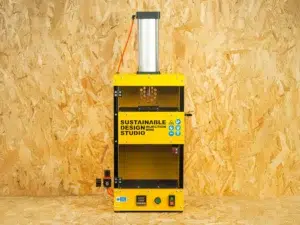 Cool Trash has added an injection molding machine to its tools. This machine converts cut up plastic pill bottles, Solo cups and plastic lids of almost any variety to turn them into trays of molded buttons. Each press of the injection molder yields 13 buttons–two different sizes of round ones and a single floral button for a touch of flair. These practical items are available as both retail and wholesale options. Patreon members can join the button of the month club to receive a new colorful group of 13 buttons throughout the year.
Cool Trash has added an injection molding machine to its tools. This machine converts cut up plastic pill bottles, Solo cups and plastic lids of almost any variety to turn them into trays of molded buttons. Each press of the injection molder yields 13 buttons–two different sizes of round ones and a single floral button for a touch of flair. These practical items are available as both retail and wholesale options. Patreon members can join the button of the month club to receive a new colorful group of 13 buttons throughout the year.
Producing buttons from up cycled plastic creates a tremendously useful item that fills a void for fiber art creators. While there is a steadily growing quantity of locally-sourced and produced yarn and raw wool available, there are not a lot of options for US made buttons and even fewer choices of buttons produced from non-virgin plastic. “There’s a really unique kinship with the fiber arts community,” shares Emma. “I’m excited to have my buttons be a part of this thriving creative space.”
Emma traveled to the Netherlands and Belgium to visit with leading Precious Plastic innovators. Her souvenirs include napkin rings, serving boards, and building blocks as well as some “free” plastic waste that she collected along the way. She relished being an American in Europe on a mission to admire store fixtures and business interior build outs made of recycled plastic. “There’s so much that is possible: hidden
cabinets, table bases, tabletops, wraparound bars, kitchen countertops,” enthuses Emma. “I achieved exactly what I wanted to do by making this trip. In addition to all the kind people I got to meet, I also learned technical information by seeing these processes in 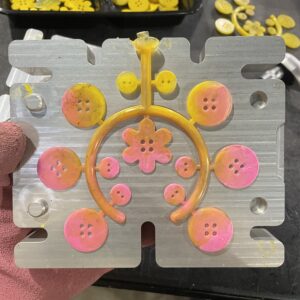 action.”
action.”

Photo credit: Lindsey Flicker
Back home in Minneapolis Emma teaches classes on plastic recycling, demonstrated the possibility of plastics at Art-A-Whirl, and has been restocking local stores with shrine shelves, pouches, and clip sets.
Local Connections
Among Emma’s favorite projects have been the custom work that she’s done with local businesses. A collaboration with Indeed Brewing repurposed PakTech (the packaging that holds the four packs of cans together) into clipboards to which Indeed attaches their beer menus in their Northeast Minneapolis taproom. She also created store fixtures for Marigold including card holders and small riser tables that add visual interest to displays. A primary objective for Cool Trash is to create custom merchandise for small businesses out of the waste they generate–just think of the cool key chains, clip boards, or carabiners that your business could share made out of the PakTechs, bottle caps, and other food packaging waste that can’t be recycled through standard programs.
Her primary goal is to provide a locally-made, recycled option for retail fixtures and branded merchandise for small businesses. Cool Trash wares are as an alternative to virgin plastic fixtures and merch manufactured overseas often using unfair labor practices and contributing to existing plastic pollution.
“I get to be creative every day and use my skills to make the world a better place,” smiles Emma. “I love every part of this work—even sorting PakTechs by color, jobs that would  probably seem tedious to most. I find it therapeutic. Doing taxes is the part that does not bring me joy.”
probably seem tedious to most. I find it therapeutic. Doing taxes is the part that does not bring me joy.”
As for the name of her business—“Since I was a teenager, anywhere I traveled I took pictures of trash I thought was cute or interesting and posted it on Instagram with the hashtag #cooltrash. When it came time to put a name on the work I was doing with recycled plastic, Cool Trash was a no-brainer. It’s perfect.”
Get in Touch
 Emma has given presentations on the Precious Plastic program and Cool Trash in the Eco Experience building at the Minnesota State Fair and has been a demonstrating artist at Art A Whirl
Emma has given presentations on the Precious Plastic program and Cool Trash in the Eco Experience building at the Minnesota State Fair and has been a demonstrating artist at Art A Whirl . She has offered classes on plastic up cycling and creative repurposing through local craft centers and with school groups.
. She has offered classes on plastic up cycling and creative repurposing through local craft centers and with school groups.
Visit cooltrash.net to see Emma’s portfolio of work done with fused plastic, hard plastic, and plarn (plastic yarn). Join her on Patreon for behind the scenes content, workshop tours, and access to the monthly button club.
Follow @cooltrashusa on Facebook and Instagram for upcoming events and new product releases.
The original publication of this feature was sponsored by the Forever Green Initiative at the University of Minnesota in the summer of 2024. Cool Trash is one of several innovators in sustainability that Meet the Minnesota Makers and Forever Green celebrated in this maker series.
 Forever Green develops and improves winter-hardy annual and perennial crops that protect soil and water health. These initiatives provide new economic opportunities for growers, industry and communities across Minnesota. Learn more about Forever Green and their community partners on their website.
Forever Green develops and improves winter-hardy annual and perennial crops that protect soil and water health. These initiatives provide new economic opportunities for growers, industry and communities across Minnesota. Learn more about Forever Green and their community partners on their website.
Visit meettheminnesotamakers.com or follow @meettheminnesotamakers on Facebook and Instagram to discover the farmers and innovators working to strengthen Minnesota’s local food networks. Meet the Minnesota Makers is a news site that connects you to the local food, farms, artists and artisans that make Minnesota thrive.

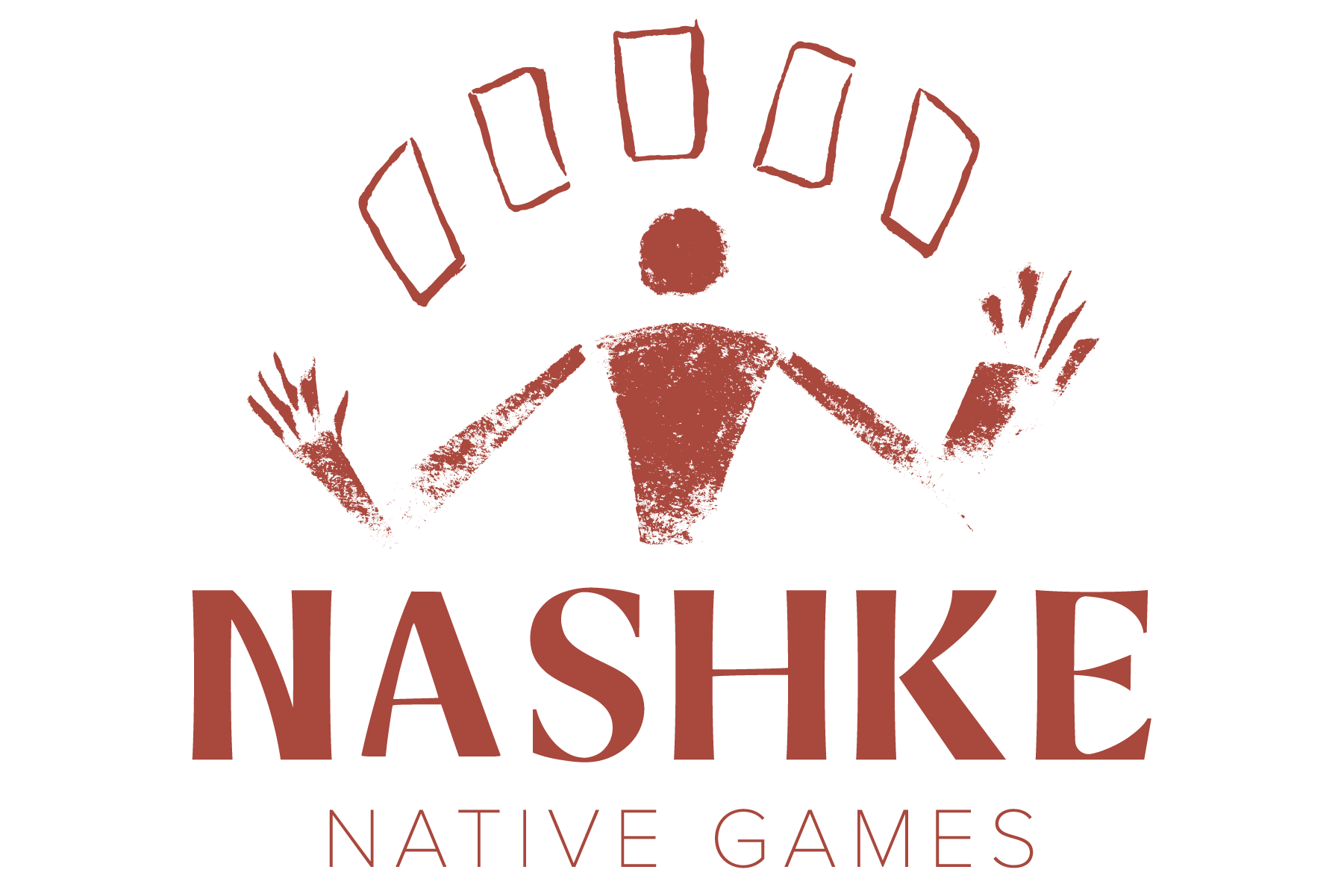



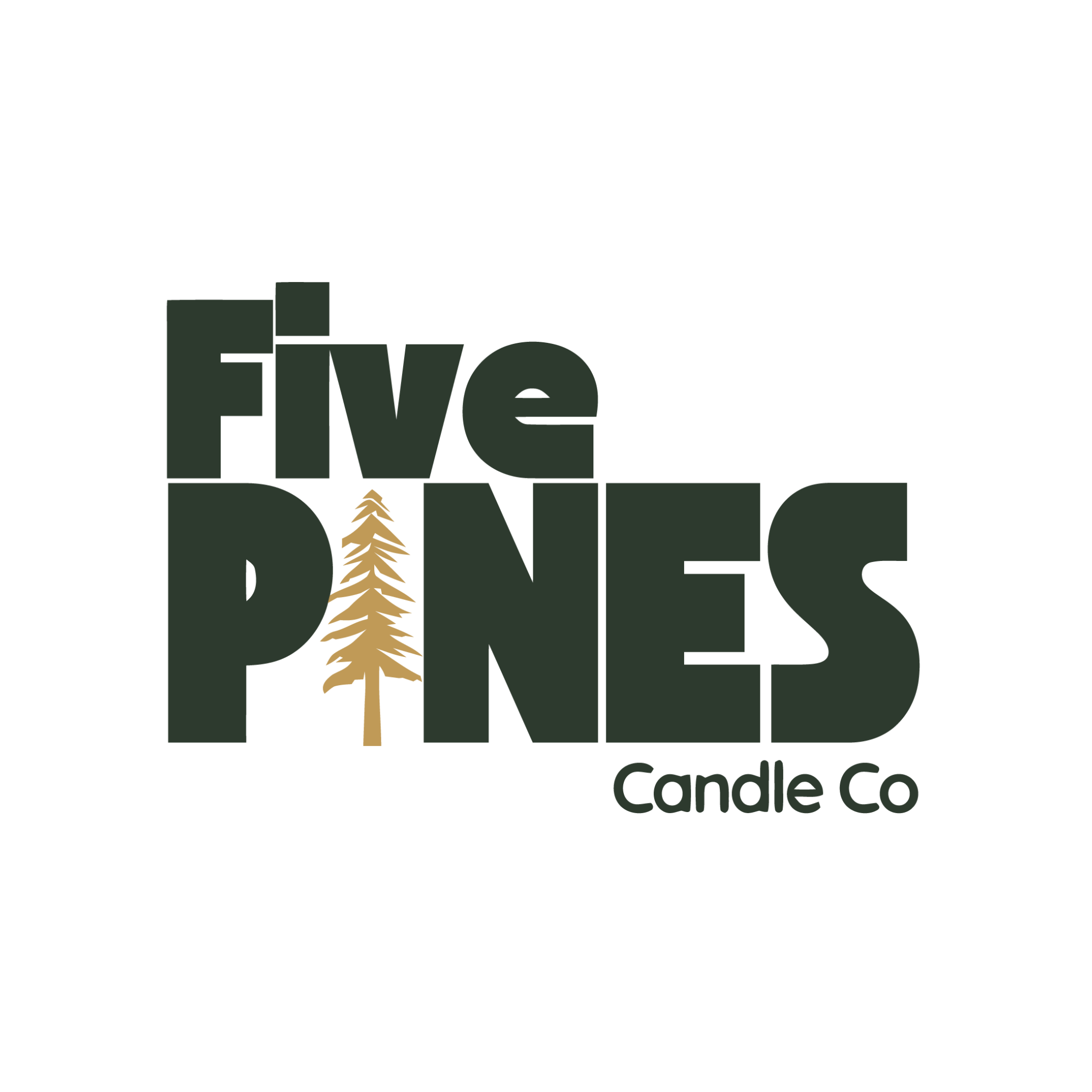
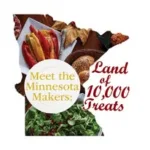

Just bought a couple of her keychains at Cedarfest/Open Streets. People around the world are figuring out how to reuse old tires and construction materials and good old regular trash. Way to go!
Thank you for supporting Cool Trash’s creative work! Emma’s vision for turning trash into treasure is exciting–so many possibilities!